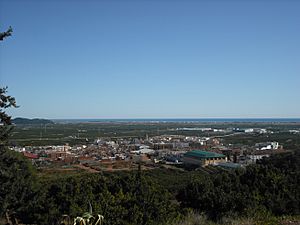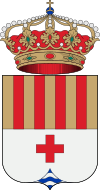Faura facts for kids
Quick facts for kids
Faura
|
||
|---|---|---|
 |
||
|
||
| Country | ||
| Autonomous community | ||
| Province | Valencia | |
| Comarca | Camp de Morvedre | |
| Judicial district | Sagunto | |
| Area | ||
| • Total | 1.6 km2 (0.6 sq mi) | |
| Elevation | 27 m (89 ft) | |
| Population
(2018)
|
||
| • Total | 3,547 | |
| • Density | 2,220/km2 (5,740/sq mi) | |
| Demonym(s) | Faurer, faurera | |
| Time zone | UTC+1 (CET) | |
| • Summer (DST) | UTC+2 (CEST) | |
| Postal code |
46512
|
|
| Official language(s) | Valencian | |
Faura is a small and charming town located in the Valencian Community of Spain. It is part of the Camp de Morvedre area. This area is known as a comarca, which is like a county or district in Spain.
Faura is surrounded by beautiful orange groves. It has a rich history that makes it a special place to visit. The town's patron saint is Saint Barbara. People in Faura celebrate her with special events and processions.
Contents
About Faura
Faura is a small municipality, which means it is a self-governing town. It is located in the Province of Valencia, within the larger Valencian Community. This community is one of Spain's 17 self-governing regions.
Location and Geography
Faura is situated in a flat area. It is very close to the Mediterranean Sea. The town's low elevation, about 27 meters (89 feet) above sea level, makes it easy to explore. The total area of Faura is quite small, only 1.6 square kilometers (0.62 square miles).
Population and Language
As of 2018, Faura had a population of about 3,547 people. The people from Faura are called Faurer (male) or Faurera (female). The official language spoken in Faura is Valencian. This language is a form of Catalan.
History of Faura
Faura has a long and interesting past. Its history dates back many centuries. The town has seen different cultures and civilizations. These groups have all left their mark on the area.
Early Settlements
Evidence suggests that people lived in this region a long time ago. The fertile land and nearby water sources made it a good place to settle. Over time, small communities grew into towns like Faura.
Medieval Times
During the Middle Ages, Faura was part of different kingdoms. It was influenced by both Christian and Muslim cultures. This mix of cultures is still seen in some of the local traditions and architecture.
Modern Era
In more recent times, Faura has grown as an agricultural town. Its economy has largely depended on farming. The orange groves around the town are a big part of its identity.
Culture and Traditions
Faura is proud of its local culture and traditions. Many of these traditions are linked to its history and religious beliefs.
Festivities
The town celebrates several important festivals throughout the year. These events bring the community together. They often include music, dancing, and traditional food.
Saint Barbara's Day
One of the most important celebrations is for Saint Barbara. She is the patron saint of Faura. During this special day, people hold a procession. They carry an image of the virgin through the streets. This is a way to show respect and celebrate their faith.
Local Cuisine
Like many towns in the Valencian Community, Faura has delicious local dishes. These often feature fresh produce from the surrounding farms. Rice dishes, like paella, are very popular in the region.
Economy
The economy of Faura is mainly based on agriculture. The town is famous for its orange production.
Agriculture
The vast orange fields around Faura are a key part of its economy. Farmers grow and harvest oranges. These oranges are then sent to other parts of Spain and Europe. This industry provides many jobs for the local people.
Local Businesses
Besides agriculture, Faura also has small local businesses. These include shops, restaurants, and services. They help support the community and its residents.
Government and Politics
Faura is governed by a local council. The head of the council is called the Alcalde, which is like a mayor.
Local Leadership
The current Alcalde of Faura is Antoni Francesc Gaspar Ramos. The Alcalde and the council members work to manage the town. They make decisions about local services and development. This includes things like public spaces, education, and town planning.
See also
 In Spanish: Faura para niños
In Spanish: Faura para niños
 | Aurelia Browder |
 | Nannie Helen Burroughs |
 | Michelle Alexander |



